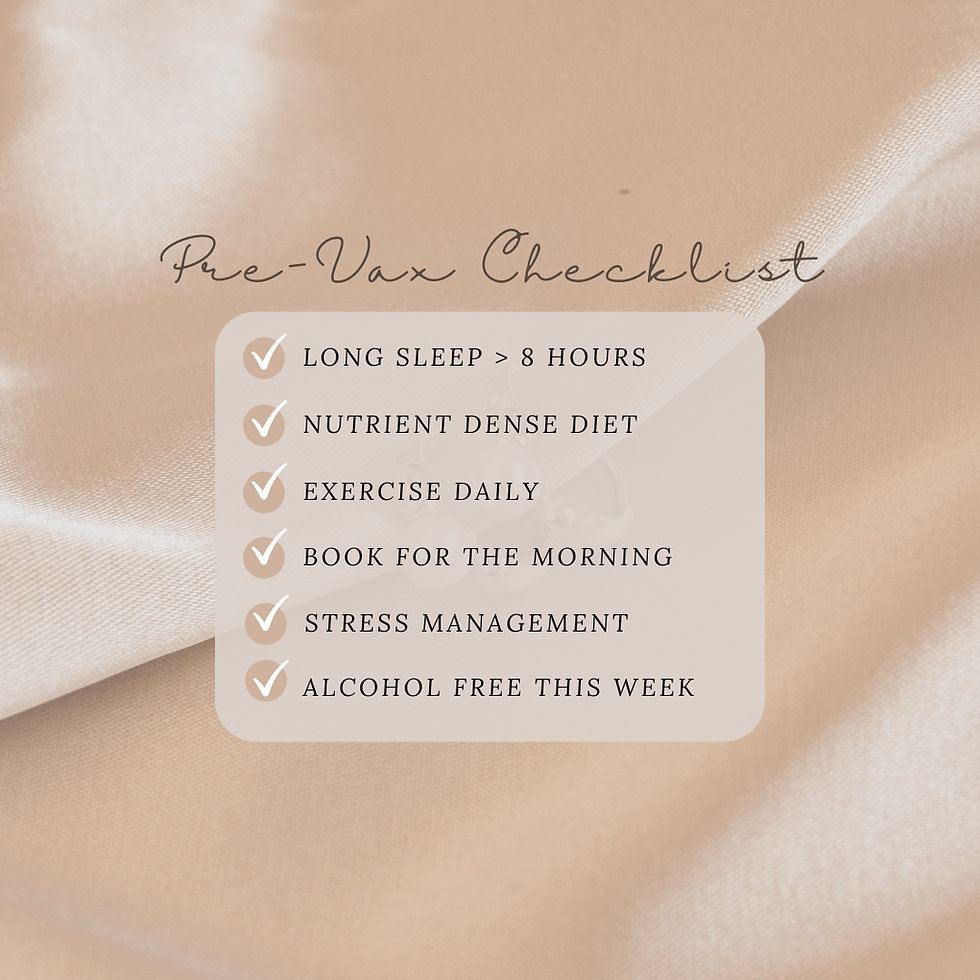Boosting your Booster
- Joanne Knight

- Jun 7, 2022
- 3 min read
If you decide to get any vaccine, there are ways to make the most it! If you are ill, it isn't advised to get a flu shot or Covid-19 vax due to immune weakness, therefore it makes sense to consider the opposite. Below I discuss common health concerns over vaccinations that have emerged or have been highlighted during the current pandemic as well as what the science says about ensuring maximum efficacy of any Vax. There are factors to consider prior to your Covid booster or flu shot this year.
Discuss concerns with your health practitioner.
They know your health history and the risks involved. Although very small, there are always risks when receiving any medical intervention. Making informed choices means getting informed with data from reputable sources.
Well known and reported issues with Covid-19 vaccines include:
Excessive Blood clotting – linked to AstraZeneca, Moderna and Pfizer vaccines. This is nothing new as other vaccines have caused the same immune response leading to excessive clotting.
Inflammation of heart tissue – pericarditis and myocarditis have been linked to Covid vaccinations. Cardiac toxicity and inflammatory responses from the pathogen trigger this reaction.
Exacerbation of autoimmune disorders – strong immune responses and inflammation can lead to induced autoimmunity. Most cases are people who are predisposed or have an existing condition.
Acute inflammatory responses – these are linked to vaccine efficacy. While uncomfortable, they are necessary for the process but can be attenuated if needed.
Often adjuvants are a concern due to allergies or metal load in the body, Covid vaccines however are free of the common substances (such as aluminium and egg) that are the reason people avoid vaccines. Full ingredients lists for are available online. At the link below you can access Pfizer, Moderna, Johnson & Johnson ingredients:

Making the most of your vaccination:
Stress support – fear of the side effects and of the actual experience is common for many. Get some moral support from friends or family. Even as adults we want to mix a medical experience with something joyous in the same day as a reward. For children, a supportive, happy environment around the experience will reduce the risk of needle-related trauma.
Boost Immunity – nutrient dense diet, antioxidant foods, lots of vegetables, vitamin C and zinc foods, omega 3’s and high fibre for gut support. Where dietary deficiencies exist, vaccinations may be less effective so nutrient balance is essential.
Reduce inflammation – avoid sugar, processed meats, alcohol, processed foods and include fresh, organic wholefoods leading up to your vax.
Exercise – regular exercise improves vaccination response. Physical activity just before and after getting the injection improves antibody production without making the inflammatory side effects worse.
Sleep – longer sleeps leading up to your vax may be helpful. Go to bed a bit early, get at least 8 hours to improve your cell memory which is essential to fight off pathogens.
Timing – more effective antibody responses to vaccines have been documented in the morning. The reason for this is unknown but could be attributed to circadian rhythms or cortisol variations over the course of the day.
References
Benedict, C & Cedernaes J, 2021, ‘Could a good night's sleep improve COVID-19 vaccine efficacy?’, Lancet Respir Med, vol. 9, no. 5, pp. 447-448.
Centre for Disease Control (CDC) 2022, Adjuvants and Vaccines, viewed 25th March 2022, <https://www.cdc.gov/vaccinesafety/concerns/adjuvants.html>
Gombart, AF, 2020, ‘A review of micronutrients and the immune system – working in harmony to reduce the risk of infection’, Nutrients, vol.. 12, no. 236.
Hallam, J, et al, 2022, ‘Exercise after influenza or COVID-19 vaccination increases serum antibody without an increase in side effects’, Brain, Behavior, and Immunity vol. 102, pp. 1–10.
Ishay, Y, et al, 2021, ‘Autoimmune phenomena following SARS-CoV-2 vaccination’, Int Immunopharmacol, vol. 99, p.107970.
Lazaros G, et al, 2021, ‘A case series of acute pericarditis following COVID-19 vaccination in the context of recent reports from Europe and the United States’, Vaccine, vol. 39, no. 45, pp. 6585-6590.
Love, AS & Love, RJ, 2021, ‘Considering Needle Phobia among Adult Patients During Mass COVID-19 Vaccinations’, Journal of primary care & community health, vol. 12.
Lynn, DJ, et al, 2022, ‘Modulation of immune responses to vaccination by the microbiota: implications and potential mechanisms’, Nat Rev Immunol, vol. 22, pp. 33–46.
Perricone, C, 2014, ‘Immune thrombocytopenic purpura (ITP) associated with vaccinations: a review of reported cases’, Immunol Res, vol. 60, no. 2, pp. 226-235.
Valenzuela, PL, 2021, ‘Physical activity: A coadjuvant treatment to COVID-19 vaccination?’, Brain Behav Immun, vol. 94, pp. 1-3.
Zhuang, CL, 2021, ‘Inflammation-related adverse reactions following vaccination potentially indicate a stronger immune response’, Emerg Microbes Infect, vol. 10, no. 1, pp. 365-375.
Zimmermann, P & Curtis, N, 2019, ‘Factors that influence the immune response to vaccination’, Clin Microbiol Rev, vol. 32, no. 2, p. e00084-18.



Comments